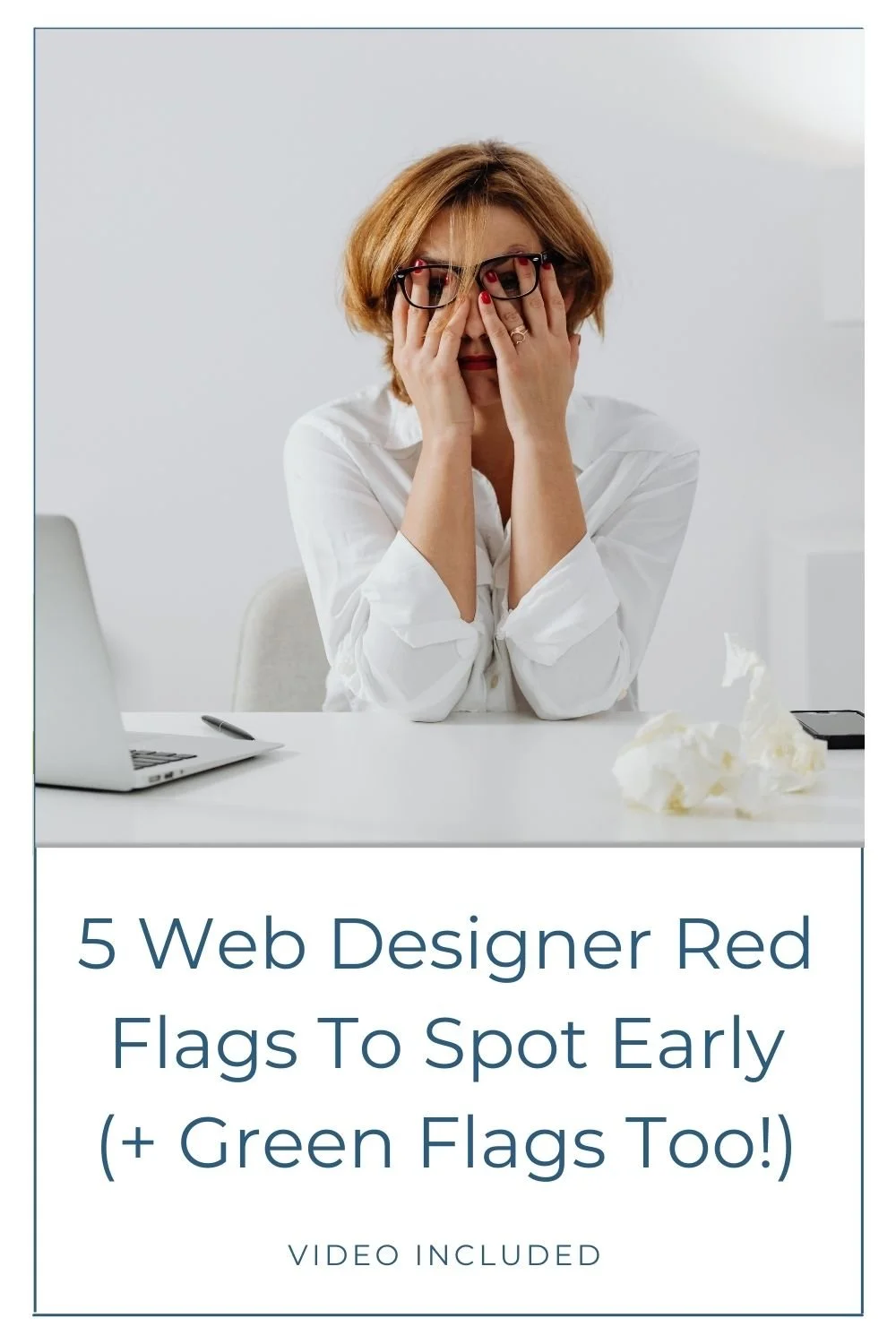SEO Made Simple: Series Wrap-up and Recommended Resources
Welcome to the fifth and final installment of my SEO Made Simple Series.
If this is the first post you read in the series, welcome! This five-part series was intended for SEO beginners who want to learn enough about SEO basics to get started without getting overwhelmed.
In this final installment, I'm going to wrap up everything we’ve covered in this series in as nice a little package as I can for you.
I’ll summarize what we went over in the previous four videos/posts and share some of my recommendations for resources and tools to continue your SEO education and journey.
Plus, I’ll share the SEO tool stack I use in my business.
Because this series of blog posts is based on a video series, they are a little different. They are basically ‘show notes’ of the videos. Lightly edited transcriptions of the video that you can refer to if you prefer reading or want a written resource for backup!
With that in mind, let’s start this wrap-up with a recap!
Series Recap
What Is SEO & Why Is It Important?
In the first video, we started at the high level with the basics of SEO. We discussed on-page, off-page, and local SEO and how they work together. Then we discussed why SEO in general and having an SEO strategy is important to the success of your online business.
SEO Keywords: What Are They And How To Research Them
We took the next step in the second video and dove into keywords.
We learned what keywords are, the types of keywords like short-tail and long-tail, and how to research them.
We reviewed keyword research tools like AhRefs, Ubersuggest, Keywords Everywhere, Moz, and Semrush. And if you’re a fellow YouTuber, I mentioned both TubeBuddy and VidIQ for YouTube SEO.
Finally, we reviewed the general cost of some of those tools and what might be most useful for you, whether free or paid.
In general, I still stick to my recommendation that with tools like Keywords Everywhere or Ubersuggest and their Chrome extensions, you can get plenty of useful data in an easily understood format for little to no money.
If you're just starting out learning about SEO, there's no need to spend upwards of $100 monthly on an in-depth, professional-level SEO keyword research tool.
There may be a time when that's important and useful for you, but if you're just getting started, start small with tools that can help your general understanding without breaking the bank or your brain at the same time.
Where Do SEO Keywords Belong On A Website?
In our third installment, we built upon the last one and dug a bit deeper into keywords.
Once you figure out what keywords you want to target in your SEO strategy, what do you do with them?
Where do you put them in your content and on your website?
We reviewed everything from website and page titles to SEO titles and meta descriptions.
I covered website page hierarchy, how to use H1, H2, and H3 headings, and how to use keywords throughout the content of the copy on your website and in your blog posts.
This was a general introduction to help you figure out how to strategically start using those keywords and placing them correctly within your website and in your content. Hence, the search engines start noticing you and serving your content on their search results page.
I also took a moment to share another useful tool for anyone writing headlines for articles, videos, etc.: CoScheduler's Headline Analyzer Studio.
It is a paid product but not terribly expensive for an annual plan.
You enter your title, and it gives you a general headline score as well as an SEO score. It will give a detailed report on each score with suggestions to improve. You can update and reanalyze one title 25 times!
Specific to SEO, it will tell you how well your keywords are doing within your title, how well it will appear in search, and how it compares to the competition. It also gives you data and information on your keywords with suggestions and alternatives.
A key feature I love is that you can test out your headlines for a blog post or an article and for YouTube videos, Instagram titles, TikTok, Podcasts, and emails. I often will have one title that's more specific to my YouTube video and another for the corresponding blog post.
SEO Tutorial: How To Set Up Your Squarespace Website For Success
This was the last video in the series, and it was a special one for my fellow Squarespace users!
Since I am both a Squarespace user and a Squarespace web designer, it's important to me to make sure that I am helping my clients to optimize SEO as much as possible and to be able to show people how easy it is to implement SEO in a Squarespace website.
There are a lot of myths about Squarespace and SEO, and quite frankly, they're out of date.
So, I wanted to show you exactly on your Squarespace website how you have all the settings at your fingertips, how easy it is to update them and share a couple of tips and tricks along the way.
Yoast for Squarespace
Of course, I would be remiss not to mention Henry Purchase and the SEOSpace Team and their tool, the SEOSpace Plugin, for Squarespace SEO.
I haven't been able to stop raving about this plugin (really a Chrome extension), and I will continue to rave about it.
If you are a Squarespace user, I cannot recommend it enough.
It does a great job at breaking down SEO and giving you immediate results, telling you exactly how your pages and website are doing regarding SEO, and giving you quick, actionable items that you can take to correct and fix any issues.
Not only that, you get to be part of a community with access to tons of great educational content.
They are constantly making great updates to this tool, and it keeps getting better and better. Plus, their customer support is amazing.
Check it out here:
This seems like a good place to segue into my SEO Toolset…
My SEO Toolset
Here’s the list of tools I currently use in my business to support my SEO Strategy.
SEOSpace Plugin (obviously 😉) to scan/audit my site, track progress, and address any issues.
For Keyword Research:
Keywords Everywhere (I use a paid plan, and so far, I’ve not paid more than $15 annually)
Ubersuggest (free Chrome Extension)
VidIQ for YouTube SEO
For Title Analysis: CoSchedule Headline Analyzer Studio
As you can see, I keep it simple with just a few tools. You don’t need a lot to develop and support your SEO strategy.
That said, a little education always helps to make using these tools much better and easier!
Continuing Education Resources
I recommend three primary resources for ongoing education as you continue to learn more about SEO and develop your strategy.
Please note that there are many wonderful resources and educators out there. So feel free to do your own research to find somebody who presents their content in a way that resonates with you and that you find helpful.
I have consumed copious amounts of content from the three folks I mention below. I've really enjoyed it, and it has helped me tremendously.
Meg Casebolt | Love at First Search
First and foremost, a shout-out to Meg Casebolt and her company, Love at First Search.
Meg has:
I took her SEO course, and I highly recommend it. It’s well put together, easily understandable, and with great support. So check out Meg Casebolt at Love at First Search!
David is a Squarespace expert, but he's also an SEO expert! He has a very good YouTube channel.
Check him out regardless of whether or not you're a Squarespace user. He does have incredible content specific to Squarespace. Still, he also knows his stuff when it comes to SEO, and he has a lot of great SEO-specific content and resources that are easily understandable, digestible, and platform-agnostic.
He also has various free and paid resources on his website, LaunchHappy.
Finally, of course, is Henry Purchase and the folks at SEOSpace. They are consistently pumping out useful content, information, and tools around Squarespace SEO and general SEO.
The things that he teaches about SEO you can apply anywhere. You can find amazing free educational content on his YouTube channel and the SEOSpace website.
So those are the three people I continue to learn from and consume their content. They’ve been very helpful to me and will continue to be as I continue my education.
Final words of wisdom
The one thing I wanted to wrap up with is that I'm always going to be a student of SEO so I can increase my skills and my expertise as I continue to grow my design business so that I can better serve my clients and help them with their SEO journey as well. The learning is never done!
That said, I wanted to provide you with the same types of information that I was looking for years ago when I was first starting out and didn't have a clue about SEO.
What are the basics?
Who are good resources to learn from?
What tools should I look at?
When I was doing all my searching and research back then, there was so much information on the internet, and it's hard to know what's good and what's not good and what's worth your time or your money.
I wanted to provide you with some tidbits and some guidance, give you the basics, and take some of the fear out of SEO because it can get complicated. You can get into the weeds, but to get started and succeed with SEO, you don't have to know everything.
You don't have to go into the weeds and all the details.
Start with the basics and get comfortable with them.
Start slow, and you'll learn just like I did, and you'll do just fine!
I hope you found this helpful and will encourage you to take the fear out of starting to build an SEO strategy.
Hopefully, you are armed now with a list of varied resources that are available to you, that are accessible, and that are useful for anyone, regardless of where they are at their stage of the SEO game.
Now, get it after it, and good luck!
If you like this content, don’t miss out on the latest posts and videos to help you with your Squarespace website and your business!
Sign up below to get all the inside scoop and updates!
You may also find these articles helpful:






























